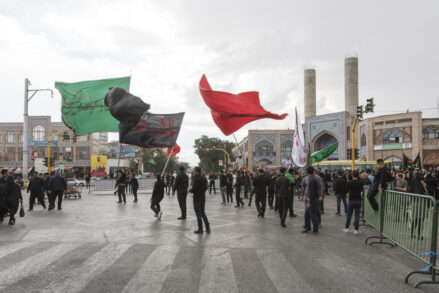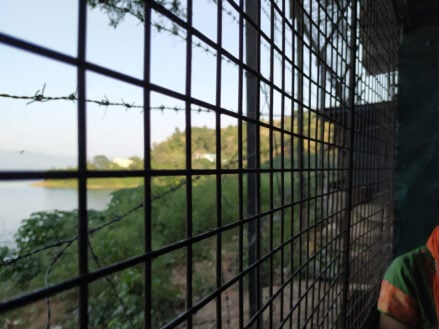As the number of Christian refugees returning to their homeland in Iraq and Syria increases, Global Christian Relief continues to hear reports reflecting a hopeful yet cautious sense of optimism for the future.
A survival story of God’s people.
You won’t find this account in the Old Testament, as first impressions might imply. But the feature protagonist and antagonist are the same. God and Satan are front and center in this narrative.
A Fight of a Different Kind
Clearly, the story of how Christianity has survived in the Middle East is nothing short of radical and a modern-day illustration of the words the Apostle Paul wrote to the persecuted church of Ephesus 2,000 years ago: “We do not wrestle against flesh and blood, but against the rulers, against the authorities, against the cosmic powers over this present darkness, against the spiritual forces of evil in the heavenly places” (Eph. 6:12).
Paul tells us this fight against ISIS is not merely physical; it’s also spiritual. Sound familiar?
Through ISIS, Satan threatened to wipe out the entire Christian population in this region known as the birthplace of Christianity. The defeat of ISIS in the Middle East is a tangible expression of a God who has carried His people since day one, a Savior who has already defeated our arch enemy and is more powerful than any group or ruler known to man at any time and place in the world.
From Where We’ve Come: The Rise and Spread of ISIS in the Middle East
At the beginning of 2014, the picture looked bleak for believers and the Christian faith in the Middle East, with some news reports declaring, “Christianity Is ‘Over’ in Iraq.” Using their Muslim faith as a backing for their violence and terror (even saying they’re acting in obedience to “God”), the Islamic extremist group ISIS had taken over Raqqa, making the Syrian city its defacto capital where they planned and carried out their terror attacks. Throughout Iraq and Syria, Christians heard the ultimatum: “Convert, leave, or die.”
The timeline below offers a brief synopsis of the rise and spread of ISIS in the Middle East:
2006: The Islamic State in Iraq (ISI) is established with Abi Omar al Baghdadi as its leader.
2008: The group’s membership strongly diminishes following a surge of U.S. troops.
2009: Support for ISI begins to grow as Iraqi Prime Minister Nouri al-Maliki begins to target Sunni Muslim leaders.
2012 to 2013: ISI launches its “Breaking the Walls” campaign in and around Iraq, carrying out 24 bombings and eight prison breaks, freeing jihadists and more than 500 convicts, many of whom were senior members of Al Quaeda.
August 2013: ISIS leads a siege on a government-controlled air base in Northern Aleppo. Using suicide car bombers, ISIS eventually captures the Mennagh airbase and sends a message to both Assad and the other opposition factions that ISIS will seek to establish a preeminent force in Syria. Soon after, the group moves into Syria and later becomes, “The Islamic State in Iraq and Syria” (ISIS).
2014: ISIS takes over Mosul, the second-largest city in Iraq, and the Syrian city of Raqqa, declaring Raqqa its defacto capital. Later that year, they take over other smaller yet important cities.
2014 to 2016: ISIS carries out its reign of terror, killing and displacing thousands of Christians before Syrian Democratic Forces (SDF) defeated ISIS in Raqqa last month. Reports from inside and outside the Middle East begin to surface, using the term “genocide” to describe what was happening to Christians, as well as other religious minorities.
2017: Mosul is liberated in July. Three months later, SDF mounts an offensive against the extremist group and on October 14 announced they have cleared ISIS fighters from the National Raqqa Hospital and Paradise Square, the infamous area where ISIS jihadists carried out public beheadings and crucifixions.
The war displaced more than 100,000 Christians, forcing families to flee their homes and live in tents in refugee camps for three years. Those who remained in their homes lived in fear and secrecy. Like the watching world, they wondered if ISIS would be victorious in their efforts to hunt down and exterminate what they call infidels (anyone who doesn’t follow and adhere to their beliefs).
Evil for Good
In the early 1990s, around 1.5 million Christians lived in Iraq. Today, that number hovers around only 200,000. The Christian population in the Middle East has declined significantly. But Christianity in Iraq and Syria is still alive. For these Christians, the words of Genesis 50:20 ring true: “As for you, you meant evil against me, but God meant it for good, to bring it about that many people should be kept alive, as they are today.”
The schemes and plots of ISIS were full of evil and death, yet reports from Iraqi and Syrian believers continue to reveal the omnipotence of God–using the ways of evil for good. Our partners in these areas have heard and shared repeated accounts of God’s hand moving and Muslims miraculously coming to Christ out of the turmoil and heartbreak that ISIS brought. And faithful and courageous friends, family and neighbors have risked their lives to share the gospel, resulting in Muslims turning from Islam and trusting in Christ as their Savior in unprecedented numbers.
Believers and churches have also grown stronger, Archbishop Yohanna Petros Mouche says of Iraqui Christians: “Three years of displacement have shaken the faith of the Christians,” he says. “But I see that many have come closer to God; their faith has become stronger. You can see the churches are full.”
In many ways, the Christian church throughout the world is part of this survival story. Around the globe, believers rallied in prayer as the crisis grew worse, many waking up to the truth and power that the persecuted church is part of their family in Christ and that, as Paul writes in 1 Corinthians 12:26, “If one part suffers, every part suffers with it; if one part is honored, every part rejoices with it.” Hundreds of thousands of individuals and churches joined hearts and voices for the persecuted church in the Middle East. Last November’s (2016) International Day of Prayer specifically emphasized believers in Iraq and Syria and the future of Christianity in the Middle East.
Coming Home
The defeat of ISIS gives Christian refugees who fled their cities during the occupation the choice of returning to their homeland. Some will not return. Others are returning slowly. But three years ago, few believers in Iraq and Syria thought they’d ever see their homeland, let alone their home and community, again.
As they make their way back, families are returning to the devastation ISIS left in its wake. Some, like Iraqi Christian teenager Noeh and his family, have come back to bombed-out homes and buildings. Running water and electricity are not always intact. Fear of hidden bombs and reoccupation are ever-present.
On top of the physical trials, returning Christians are also facing emotional and spiritual barriers. Forced to flee and live in uninhabitable conditions rampant throughout refugee camps, believers of all ages, including children, continue to face trauma and severe forms of PTSD (post-traumatic stress disorder). Though increasing numbers of believers are coming home in hopes of being light in the physical and spiritual darkness, they also acknowledge their great need–and great difficulty–to forgive both their persecutors and their betrayers. Many times, neighbors, even family members, exposed believers’ faith to ISIS, often in attempts to protect their own families.
One With Them in Iraq and Syria
Our Middle East brothers and sisters need prayer and support from the global church. The road ahead is long and hard.
Part of praying for and ministering to our Christian brothers and sisters in the Middle East is understanding that they have faced real tragedy and persecution at the hands of ISIS. Will you pray for returning believers as they focus on the Kingdom work God has yet to reveal both in their hearts and communities? Pray that they hold tight to hope and the truth of the gospel as they seek to forgive and share their story of how God has sustained them. Pray that God would give them strength through the trials they’re currently facing and will encounter in the weeks, months and years ahead. For a comprehensive list of prayer needs and wisdom for interceding, see the article “15 Specific Prayers for God’s Work in Iraq.”
The story of Christianity in Iraq and Syria is still being written. The threat of ISIS in areas like Baghdad and the political instability in areas, such as Kirkuk, still pose persecution threats to Middle East believers. Persecution is still very real. Eternally, we know the end of the epic story and who wins. We know the protagonist defeats the antagonist. Until then, as a believer and part of the global body of Christ, you’re part of this unfolding story with an integral part to play in the future of the church and God’s Kingdom here on earth and in Heaven.






